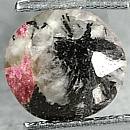|
|
||||||||||||||||
|
||||||||||||||||
|
||||||
|
|
|
|
Katophorite
(Ferri-Katophorite,
Ferro-Katophorite, Magnesio-Katophorite, etc.) |
|
| | |
| Discovered in 1894; IMA status: Valid (IMA Approved 1997; redefined by IMA in 2012) | ||
|
| ||
|
Chemistry |
|
|
| |
|
Na[NaCa][(Fe2+,Mg)4Al](Si7Al)O22(OH)2 | |
|
|
Sodium Calcium Iron Magnesium Aluminum Silicate Hydroxide |
|
Emperical Chemical Formula: |
Na1.2K0.3Ca1.3Fe2+3.25Mg1.5Ti0.2Mn2+0.2Al0.7Si7.3O22(OH)22 |
|
Molecular Weight: |
939.86 gm |
|
Composition: |
Potassium |
1.25 % |
K |
1.50 % |
K2O |
|
|
Sodium |
2.94 % |
Na |
3.96 % |
Na2O |
|
|
Calcium |
5.54 % |
Ca |
7.76 % |
CaO |
|
|
Magnesium |
3.88 % |
Mg |
6.43 % |
MgO |
|
|
Titanium |
1.02 % |
Ti |
1.70 % |
TiO2 |
|
|
Manganese |
1.17 % |
Mn |
1.51 % |
MnO |
|
|
Aluminum |
2.01 % |
Al |
3.80 % |
Al2O3 |
|
|
Iron |
19.31 % |
Fe |
24.84 % |
FeO |
|
|
Silicon |
21.81 % |
Si |
46.67 % |
SiO2 |
|
|
Hydrogen |
0.21 % |
H |
1.92 % |
H2O |
|
|
Oxygen |
40.86 % |
O |
|
|
|
|
|
100.00 % |
|
100.09 % |
= TOTAL OXIDE |
|
|
|
||||
|
Classification |
|
|
| |
|
Silicates (Germanates) | |
|
8/F.09-30 | |
|
|
9 : SILICATES (Germanates)
|
|
Related to: |
Katophorite Root Name Group > Sodium-Calcium Amphibole Subgroup > w(OH, F, Cl)-dominant Amphibole Group > Amphibole Supergroup. Ferri-Katophorite - Magnesio-Katophorite Series |
|
Members of Group: |
Katophorite Root Name Group: Ferri-Katophorite, Ferri-fluoro-Katophorite, Ferro-Katophorite, Fluoro-Katophorite, Katophorite, Magnesio-Katophorite, Potassic-ferri-Katophorite, Potassic-ferri-Katophorite, Potassic-fluoro-Katophorite |
|
Varieties: |
Ferri-Katophorite, Ferri-fluoro-Katophorite, Ferro-Katophorite, Fluoro-Katophorite, Katophorite, Magnesio-Katophorite, Potassic-ferri-Katophorite, Potassic-ferri-Katophorite, Potassic-fluoro-Katophorite |
|
Synonyms: |
Cataphorite, IMA2013-140, Magnesio-Katophorite |
|
|
|
|
Crystal Data |
|
|
|
|
|
Prismatic, granular, also as fibrous aggregates or dendrites and skeletal crystals. Commonly rimming other minerals. |
|
|
|| {100} |
|
|
|
|
|
Physical Properties |
|
|
|
|
|
Perfect on {110}, intersecting at ~56° and ~124°; parting on {010} |
|
|
Conchoidal |
|
|
Brittle |
|
|
5.0 - 6.0 |
|
|
3.2 - 3.5 (g/cm3) |
|
|
None |
|
|
Not Radioactive |
|
|
|
|
|
Optical Properties |
|
|
|
|
|
Black, dark green-black, bluish black; reddish yellow, bluish green in thin section |
|
|
Transparent to translucent, opaque |
|
|
Vitreous |
|
|
1.640 - 1.692 Biaxial ( - ) |
|
|
0.020 |
|
|
Strong, r < v |
|
|
Strong; reddish yellow, reddish brown, and dark green to black |
|
|
n/a |
|
|
|
|
|
Occurances |
|
|
|
|
|
Geological Setting: |
In alkalic volcanic and plutonic igneous rocks; in blueschist facies jadeitites. |
|
Common Associations: |
Arfvedsonite, Aegirine, Nepheline, Pyroxenes, Eckermannite, Chromite |
|
Common Impurities: |
n/a |
|
Co-Type Localities: |
•
Ferro-Katophorite: first described by W.C.
Brøgger (1894) as an amphibole mineral which
he found at three localities in the
Permian Oslo Region, Norway: |
|
Year Discovered: |
•
Ferro-Katophorite: 1894 |
|
View mineral photos: | |
|
|
|
|
More Information |
|
|
|
|
|
| |
|
|
|
|
The Kataphorite Group species containing magnesium (Mg) and with ferric iron (Fe3+) greater than aluminum (Al) in the C position was named Magnesio-Katophorite in the 1978 and 1997 IMA amphibole nomenclature. However, the Katophorite Group minerals were redefined in the 2012 IMA amphibole nomenclature. The 2012 change renamed the Mg, Fe3+ and (OH) dominant member of the group Ferri-Katophorite. The
mineral Katophorite was first described by W.C.
Brøgger (1894) as an Amphibole mineral that he
found at three localities in the
Permian Oslo Region, Norway. The minerals originally designated by Brøgger (1894) as "Katophorite" are,
according to the new Amphibole nomenclature, classified as Ferro-Katophorite.
Katophorite, without any element modifiers, is the name
given to an Amphibole occurance found in 2013 at
the Hpakant-Tawmaw Jade
Tract, Hpakant Township, Mohnyin District, Kachin State, northern Myanmar
(Burma). Katophorite
is named from
the Greek word Katophorite is typically black, dark greenish black or bluish black with vitreous luster and usually opaque but may also be transparent to translucent in thin slivers. Black Katophorite Is often found associated with greenish black Arfvedsonite, white Feldspar, and red Eudialyte at the Kipawa alkaline complex in Canada (see gem pictured above). This makes for a very unusual and attractive gem. Distribution:
may occur in the Oslo (Christiania) district, Norway,
from where it was originally described. On the Rallier-du-Baty
Peninsula, Kerguelen Island, in the south Indian Ocean.
In the Kipawa alkaline complex, Les Lacs-du-Témiscamingue, Témiscamingue RCM, Abitibi-Témiscamingue, Québec, Canada. At the
Hpakant-Tawmaw Jade
Tract, Hpakant Township, Mohnyin District, Kachin State, northern Myanmar
(Burma). |
|
|
We
have not photographed our Katophorite
gems yet. Please
check back soon. |
